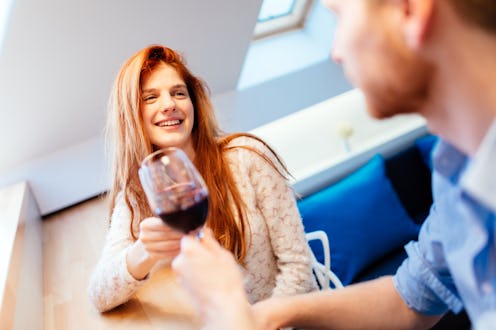
The way drinking affects relationships can vary. For some couples, boozing produces a mercurial cocktail of fantastic nights and cozy, hungover days. You can broach tough subjects when you're loosened up, you can have carefree sex in weird places, and you can get into giggle fits like you're in the fifth grade again and order Seamless in bed the next morning.
For other couples, drinking produces miserable evenings and/or nightmarish days, with drunken arguments, petty misunderstandings, and wicked, hangover-driven tiffs. And then there's that whole not remembering why you're even mad in the first place thing. Basically, it all comes down to the simple fact that if you choose to drink with your partner, you're stuck in a constant threeway: your relationship with alcohol, your relationship with your S.O., and your relationship with alcohol as a couple.
Teetotalers and those in program are obviously exempt from this tangled web of wine, beer, and/or booze. But if you're down to drink after work, or at brunch, or at a concert, or at 3 p.m. on a Wednesday, you're likely to ask your S.O. to join you — or vice versa. So how, exactly does this affect your relationship, and in what ways does drinking become a good or bad thing between you and your babe? These three studies looked into relationships, love, and liquor:
1. Your Drinking Habits Can Shift To Mirror Your Partner's
According to a study published in Developmental Psychology, single guys and girls are more likely to imbibe in the style and frequency of their friend group. When dating, they're more likely to share drinking habits with their S.O. Granted, these findings are based on a survey of over 1,000 12-19 year olds who were drinking illegally, but it isn't news that your partner's drinking style can have an influence on yours.
Signifiant research suggests that drinking habits are made early in life. If you're drinking every weekend in college, it's not a stretch to think you'd do the same in a job. Humans are creatures of habit, so it stands to reason that if you're mirroring your lover's shot intake in your late teen years, it might continue into your twenties. Unless, of course, you decide to consciously make some changes.
2. Drinking Can Bring You Closer
A study that lasted over 10 years and analyzed 2,700 heterosexual couples over 50 found that pairs who drank together or who didn't drink at all had better relationships. This is probably because leisure activities where one person is wasted and the other isn't are a major bummer. Sure, sometimes it's cute to have your S.O. play DD while you go out with friends, but other times, it's annoying AF when you can't have a conversation because one person is three sheets to the wind. In the end, it's not alcohol per se that keeps folks together, but having similar interests and spending time together doing the same thing that can help stoke the fires of passion — or at least keep you generally happy with your bond.
3. Committed Relationships Might Make You Drink Less
Using a sample of 302 college students and drinkers, one study published in the Journal of Applied Social Psychology looked into how imbibing solo differs from coupled drinking. The results showed that those who were in committed relationships drank less than their single friends — but only when their partners were present. (Kinda sounds like a "when the cat's away the mice will play situation?)
There was also a positive correlation of increased sexual activity with drinking — but only for those not in committed relationships. So, when you're hanging with your crew and your partner, you aren't as likely to drink as much as when you're hanging with friends only. And when it comes to getting lucky, you're more likely to drink 'n do it if you're casually dating or single. For those in LTRs, looks like TV and drunk pizza will have to do.
Images: Fotolia; Giphy (3)